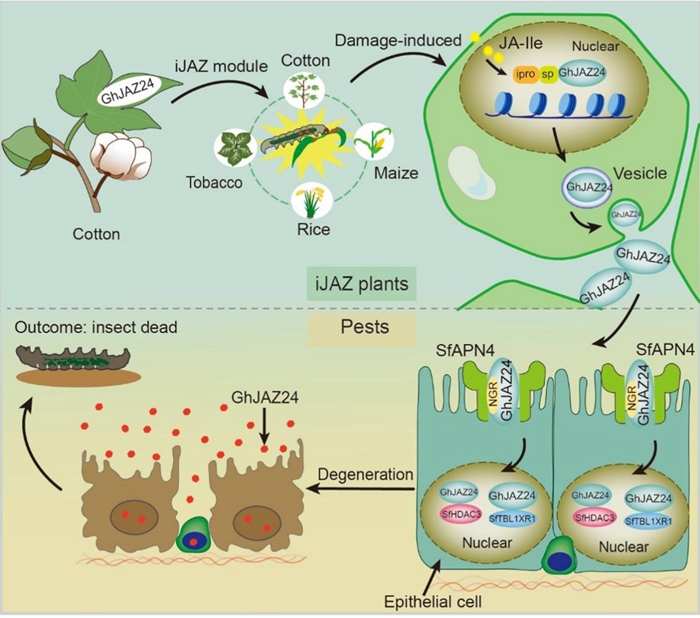A natural insecticidal protein of cotton confers resistance to lepidopteran pest in multiple crop species
Recently, a paper entitled “iJAZ-based approach to engineer lepidopteran pest resistance in multiple crop species” has been published by the Nature Plants . In the paper, researchers from the Institute of Cotton Research (CCRI) reported a novel plant insecticidal protein from cotton, which confers resistance to lepidopteran pest in multiple crop species.
Fall armyworm ( Spodoptera frugiperda J.E. Smith) is a lepidopteran pest that can damage more than 350 plant species belonging to 76 families, and has developed field-evolved resistance against genetically engineered crops expressing the bacterial Bacillus thuringiensis (Bt) Cry1Ac proteins based on mutations affecting the function or expression of midgut receptors. Therefore, new insecticidal proteins are urgently needed to control lepidoptera pests such as fall armyworm.
This study showed that overexpression of jasmonate ZIM-domain (JAZ) protein GhJAZ24 confers resistance to cotton bollworm and fall armyworm, while also causing sterility in transgenic cotton by recruiting TOPLESS and histone deacetylase 6. Researchers identified the Asn-Gly-Arg (NGR) motif of GhJAZ24 that recognizes and binds the aminopeptidase N receptor, enabling GhJAZ24 to enter cells and disrupt histone deacetylase 3, leading to cell death. To overcome plant sterility associated with GhJAZ24 overexpression, researchers developed iJAZ (i, induced), an approach involving damage-induced expression and a switch from intracellular to extracellular localization of GhJAZ24. iJAZ transgenic cotton maintained fertility and displayed insecticidal activity against cotton bollworm and FAW. Additionally, iJAZ transgenic rice, maize, and tobacco plants demonstrated insecticidal activity against their lepidopteran pests, resulting in an iJAZ-based approach for generating alternative insecticidal proteins with distinctive mechanisms of action, thus holding immense potential for future crop engineering.
This research was supported by the National Key R&D Program of China no. 2020YFA0908000 (M.R. and H.M.) and no. 2023YFE0199400 (M.R.), the National Science Foundation of China no. 31621005 (F.L.), no. U23A20182 (F.L.), no. U1804231 (F.L.) and no. 31972469 (M.R.), the key project at central government level no. 2060302 (M.R.), the Sichuan Science and Technology Program no. 2023YFQ0100 (M.R.), no. 2023ZYD0089 (M.R.), no. 2022YFH0054 (M.R.) and no. 2023JDG0028 (M.R.), the Local Financial Funds of Chengdu National Agricultural Science and Technology Center no. NASC2023TD08 (M.R.), no. NASC2021ST08 (M.R.), no. NASC2021PC04 (M.R.) and no. NASC2022KR07 (M.R.), the Central Public-interest Scientific Institution Basal Research Fund no. S2023011 (F.L.), and the Science and Technology Innovation Project of the Chinese Academy of Agricultural Sciences no. 34-IUA-02 (M.R.), and the Innovation Program of Chinese Academy of Agricultural Sciences (F.L.).
Prof. Fuguang Li from CCRI is the corresponding author, Associate Prof. Huijuan Mo from CCRI is the first author. Prof. Maozhi Ren from Institute of Urban Agriculture, Prof. Xiaoya Chen from Shanghai Chenshan Botanical Garden, and Prof. Jonathan F Wendel from Iowa State University are the co-corresponding authors. Ph.D. student Huimin Chang from CCRI, Dr. Ge Zhao from Zhengzhou University, and Prof. Guanjing Hu from CCRI are the co-first authors.
The article can be found: https://www.nature.com/articles/s41477-024-01682-3

Fig 1. Schematic overview of the mechanism of action of the insecticidal NGR-containing GhJAZ24 protein on fall armyworm.
By Huijuan Mo (mohuijuan@caas.cn)
-
 May 11, 2024WRI Deepens Agricultural Technology Cooperation with Agricultural Research Institutions in Uzbekistan
May 11, 2024WRI Deepens Agricultural Technology Cooperation with Agricultural Research Institutions in Uzbekistan -
 Apr 28, 2024CAAS President Meets President of Murdoch University
Apr 28, 2024CAAS President Meets President of Murdoch University -
 Apr 18, 2024Opening Ceremony of the Training Workshop on Wheat Head Scab Resistance Breeding and Pest Control in Africa Held in CAAS
Apr 18, 2024Opening Ceremony of the Training Workshop on Wheat Head Scab Resistance Breeding and Pest Control in Africa Held in CAAS -
 Apr 03, 2024IPPCAAS Co-organized the Training Workshop on Management and Application of Biopesticides in Nepal
Apr 03, 2024IPPCAAS Co-organized the Training Workshop on Management and Application of Biopesticides in Nepal -
 Mar 28, 2024Delegation from the School of Agriculture and Food Science of University College Dublin, Ireland Visit to IAS, CAAS
Mar 28, 2024Delegation from the School of Agriculture and Food Science of University College Dublin, Ireland Visit to IAS, CAAS
